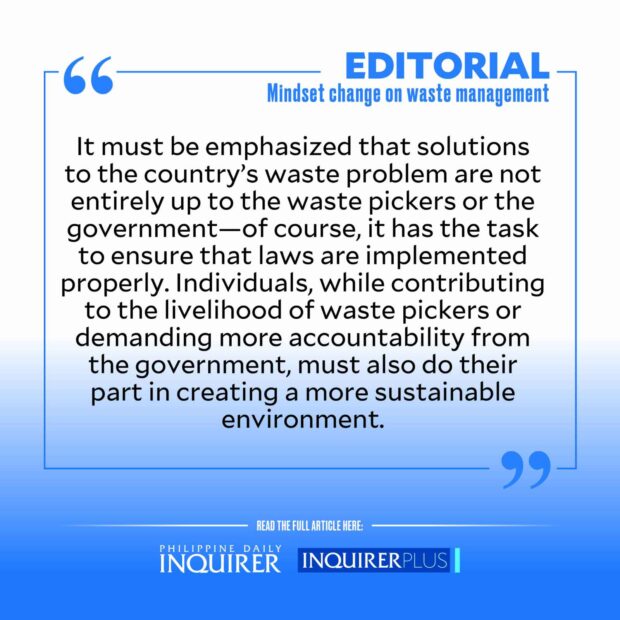Waste segregation is an essential task that should be practiced starting from individual households. Unfortunately, many Filipinos either find it too laborious or have never been taught how to do it properly. Consequently, the responsibility of waste management has largely fallen on waste pickers, locally known as “mangangalakal”, who scour neighborhoods in search of recyclable materials or sift through garbage at dump sites to find items they can sell.
Recently, Environment Secretary Ma. Antonia Yulo-Loyzaga proposed integrating these informal workers into the expanded producer responsibility (EPR) system. This recognition of their vital role in managing the country’s daily waste production can significantly improve waste collection as the Philippines transitions to a circular economy. Loyzaga emphasizes the importance of this sector, stating that the entire collection system would not function without them.
To implement this initiative successfully, collaboration between local government units (LGUs) and the social welfare department is crucial. It should be pursued alongside other efforts aimed at reducing waste. Currently, the Philippines is responsible for over one-third of all global oceanic plastic waste due to the limited access to disposal facilities and sanitary landfills for at least 70 percent of the population. While the country has laws, such as Republic Act No. 9003 or the Ecological Solid Waste Management Act of 2000, addressing the waste problem, a recent performance audit report by the Commission on Audit (COA) highlights a steady increase in solid waste generation over the years. The COA predicts even further increases in the future.
In addition to inconsistent implementation of waste segregation laws and the presence of mixed wastes in landfills, the lack of discipline among Filipinos is also a challenge. A change in mindset is necessary for effective solid waste management. Department of Science and Technology Undersecretary for research and development, Leah Buendia, emphasizes the need for a paradigm shift and highlights the importance of an extensive information and education campaign on sustainable consumption and lifestyle. However, this may be difficult to achieve in a developing country like the Philippines, where consumption habits are still heavily influenced by developed countries with advanced waste disposal facilities.
Nevertheless, there are existing practices in the Philippines that can be expanded upon. For example, old clothes are already recycled as rags, and leftover food is given to animals or used for composting. These practices can be taken further by upcycling clothes and other materials, as some local brands are already doing, and recycling leftovers into biogas, animal feed, or fertilizer, similar to South Korea’s successful model since 2005. South Korea now recycles nearly 100 percent of its food waste, thanks to automated food waste collectors in apartment complexes. The Philippines, with its staggering amount of food waste, can learn from this example, especially considering the irony of generating millions of tons of food waste while many Filipinos go hungry.
Currently, only two LGUs—Marikina and Muntinlupa—have established systems that process food waste into other by-products. However, solutions to the waste problem require efforts not only from waste pickers and the government but also from individuals. By supporting waste pickers and holding the government accountable, individuals can contribute to finding solutions. Japan, which faces its own challenges with plastic waste, has implemented a comprehensive system of waste sorting and collection, taught in schools and practiced at home. Each waste category has its designated bin, and collection points and recycling bins are conveniently accessible. This habit of waste sorting has become deeply ingrained in Japanese society.
Addressing the mounting waste problem in the Philippines calls for the participation of every Filipino, from properly disposing of garbage to practicing waste sorting, reusing, and recycling. It ultimately comes down to adopting a new mindset and incorporating values like being “masinop” (frugal) and “malinis” (clean) in how we manage waste.
Denial of responsibility! VigourTimes is an automatic aggregator of Global media. In each content, the hyperlink to the primary source is specified. All trademarks belong to their rightful owners, and all materials to their authors. For any complaint, please reach us at – [email protected]. We will take necessary action within 24 hours.


